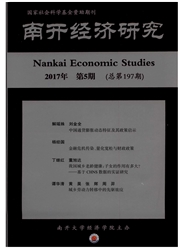

 中文摘要:
中文摘要:
本文在中国独特的制度环境下研究要素市场分割对劳动收入份额的影响。通过建立模型发现:要素市场分割将扩大地区间的资本集约度差距,在资本-劳动呈替代关系时会降低劳动收入份额。通过利用1998—2007年中国工业企业数据构建279个城市的面板数据,本文实证发现:要素市场分割加剧了中国的资本集约度差距,并降低劳动收入份额;在制度环境越差的地区,要素市场分割越严重,劳动收入份额也越低。考虑可能存在内生性问题,采用省际区域的面板数据进行稳健性分析,上述研究结论依然成立。本文研究意味着,通过改善制度环境和缩小要素市场分割,既能促进经济增长,又能提高劳动收入份额。
 英文摘要:
英文摘要:
This paper studies the effect of factors market segmentation on labor income share in China's unique institutional environment. By modeling we find: Factors market segmentation expands capital(Intensity)gap between regions, and when the capital-labor relation is alternative, it will reduce the share of labor income. Using Chinese industrial enterprises data (1998-2007)to build the panel data of 279 cities, the empirical research finds: Factor mar- ket segmentation exacerbates the regions'capital gap, and reduces labor income share; In the bad institutional environment of the region, the more serious the elements market segmentation is, the lower the share of labor income is. Even controlling the endogeneity, abnormal sample points, and using of inter-provincial panel data, these findings are robust. The conclusion means that improving the institutional environment, reducing the factor market segmentation, can both promote economic growth and improve the labor income share.
 同期刊论文项目
同期刊论文项目
 同项目期刊论文
同项目期刊论文
 期刊信息
期刊信息
